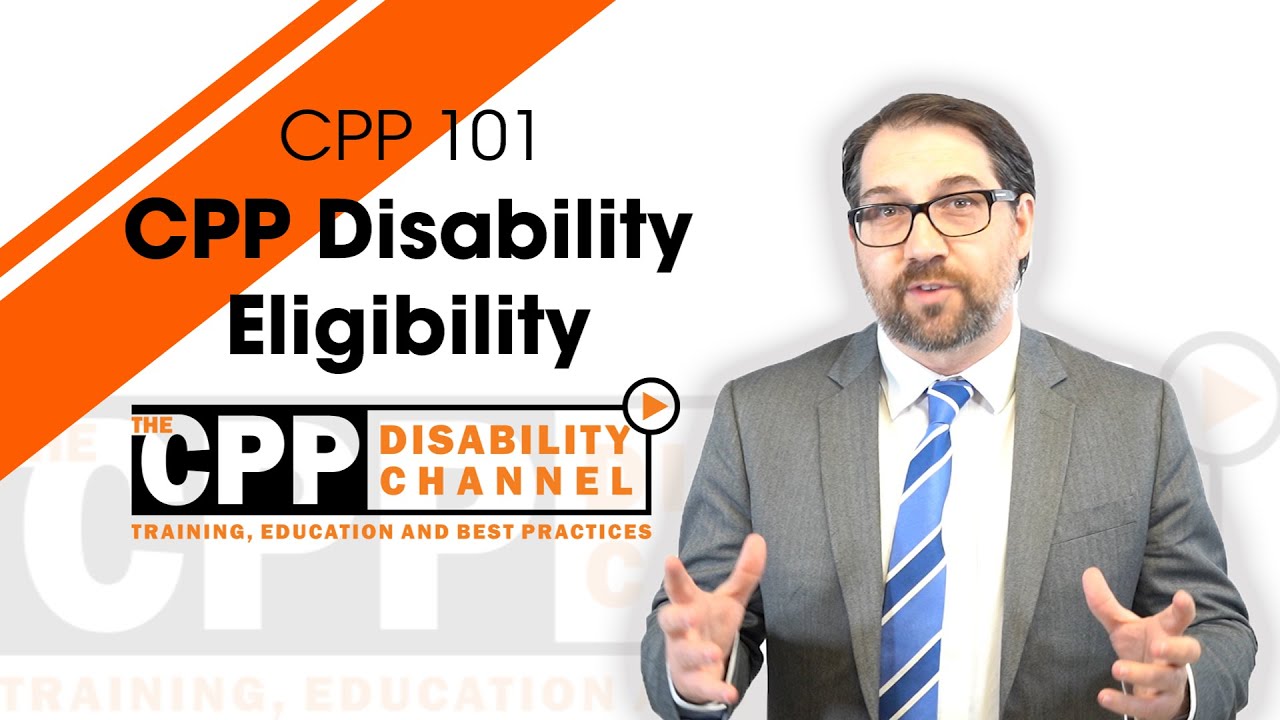Short-term disability (STD) is a legal term that can mean different things. It most often refers to a limited period of disability that qualifies a person for disability benefits. Sometimes, short term disability can refer to a specific disability benefits plan or program. Below, I discuss both aspects of short term disability Canada. Whether you are considering taking a sick leave from work. Or have already started a short term disability claim. This Guide will help you understand how short term disability works in Canada. And what you can do to improve your chances of success.
Short term disability Canada guide
In this guide, we are going to explain everything you need to know about Canada short term disability, including what it is, how to apply short term disability, how long it lasts, how much it pays, what conditions qualify and more.
If you’re only here for one specific topic, feel free to jump there now by clicking on the corresponding section in the table of contents. If not, let’s dive in, starting with what even is short term disability and how does it work?
Chapter 1
Short-Term Disability Basics
In this Chapter, I’ll help you understand the basics for short-term disability in Canada in 2024.
So, if you don’t know much about short-term disability, or want to make sure you are on the right track, you will love this chapter.
In later chapters I will cover more practical things like how to apply and what happens after an approval.
But for now, let’s cover the basics.

What is short term disability, and how does short term disability work?
So, what is short term disability? The term short term disability has two meanings. The first one refers to a limited period of disability that qualifies a person for income replacement benefits. The period of disability can range from 17 to 52 weeks, depending on the specific plan.
People also use the term to describe an insurance product sold to businesses and organizations. It provides the organizations’ employees with income loss protection for short absences from work. Such group insurance is bought by the organization for the benefit of the employees or members of the organization. However, it is not included in all group insurance plans. You always need to check your own insurance plan to see if it includes short-term disability.
Now that we’ve covered both meanings, let’s talk about how STD benefits work. All short term disability plans have different requirements, so you’ll have to check your STD benefit booklet to see exactly how it will work in your situation. With that said, most STD plans share a similar process.:
- You become ill or injured and need to take time off work
- You apply for short-term disability benefits as well as any other benefits you may qualify for
- You are approved or denied
- If denied, you appeal the denial
- If approved, you stay on benefits and receive weekly indemnity benefits until you recover or until they run out
- If you are still struggling after benefits run out, you apply for long term disability benefits if you have them and/or any other benefits you may qualify for (i.e., CPP disability)
Types of short term disability plans
There are two types of short-term disability benefits in Canada. To get benefits, you must be covered under one of these.
Group insurance plans
Some jobs provide group benefits for their employees. These usually include medical, dental, and drug coverage. Sometimes, they have short-term disability benefits too. So, if you have group benefits through your job, you might have short-term disability benefits.
Employer-funded plans
Some jobs fund their own short-term disability plans. Some are simple. For example, they will continue your salary with just a sick note. Others are more complex. They might take longer to come to a decision. Some bring in people to help you with rehabilitation.
Sometimes, work-funded plans look like group plans. It might seem like an insurance company is in charge of judging claims and paying, for example. But, behind the scenes, it’s the employer who pays.
List of short-term disability insurance companies and claim administrators
Short-term disability benefits can come from a number of companies. They are either insurance or claim management companies. Following is a list of the most common companies involved with short-term disability benefits. You can click through for more information.
Short-term disability insurance companies:
- ACA Insurance
- Assumption Life Financial Services
- Blue Cross Life Insurance Company
- BMO Life Assurance Company
- Canada Life Assurance Company (formerly Great West Life)
- Canadian Tire Life Insurance
- Co-operators Life Insurance Company
- Desjardins Financial Security Assurance Company
- Empire Life Insurance Company
- Fenchurch General Insurance Company
- IA Excellence Life Insurance Company
- Industrial Alliance Life Insurance
- Industrial Alliance Pacific Life
- La Capitale Life Insurance
- London Life Insurance Company
- Manulife / Manufacturers Life Insurance Company
- Medavie Blue Cross
- New York Life Insurance/ Cigna
- Primerica Life Insurance Company
- RBC Life Insurance Company
- Sun Life Assurance Company of Canada
- Standard Life Insurance Company
- SSQ Life Insurance Company
- ScotiaLife Financial
- UL Mutual Company
- Wawanesa Life Insurance Company
Claim administrators:
Employers and insurance companies can have other companies act for them. These are also known as third-party administrators. They judge and pay claims on behalf of the plan providers.
Following is a list of short-term disability claim administrators:
- Adminplex Resource Services Inc
- AAS / Automated Administration Services Inc
- AGA Benefit Solutions
- BBD / Benefits by Design
- Belmont Health & Wealth
- Benecaid
- Canada Life
- Cowan
- D.A Townley
- Dehoney Financial Group
- ECON Group Inc
- Edge Benefits
- Group Health Benefit Solutions
- Johnson
- Johnston Group
- Johnstone’s Benefits
- Mainion
- Manulife
- Medavie Blue Cross
- Medisys Health Inc
- Morneau Shepell
- Oncidium Health Inc.
- OTIP / Ontario Teachers Insurance Plan
- People Corporation
- RWAM Insurance Administrators Inc.
- Sedgwick
- Sunlife
- Sutton Special Risk
How long is short term disability in Canada?
STD benefits are paid for a specific period of time. This is called the benefit period. The duration of the benefit period varies from plan to plan. The maximum benefit period is 17 weeks for most plans but can go as high as 52 weeks.
Always read your group benefits booklet or talk to your benefits administrator about how long your STD benefits will last. If your illness or injury persists beyond the benefit period, you may be eligible for long term disability coverage. Check out our Ultimate Guide to long term disability to learn more.
How to extend short term disability
You can’t “extend” short term disability once the benefit period ends. As discussed above, if your illness continues to prevent you from returning to work after your short-term disability runs out, then you may be eligible to apply for long term disability coverage.
Long term disability and short term disability eligibility criteria are different, given that LTD is meant to cover long term illnesses and injuries. So, read your policy or group benefits booklet to see if you qualify. If you still aren’t sure after going through the booklet, book a free consultation with our team, and we can answer any questions you may have (without giving specific legal advice).
Chapter 2
How to Apply for Short-Term Disability Benefits
In this chapter, I overview how to file a claim for short-term disability benefits
So, if you think you are eligible for benefits, this is how you apply for payments. We also overview how to apply for EI sickness in each province. While the process is the same in every province there are different mailing addresses.
Let’s dive in!
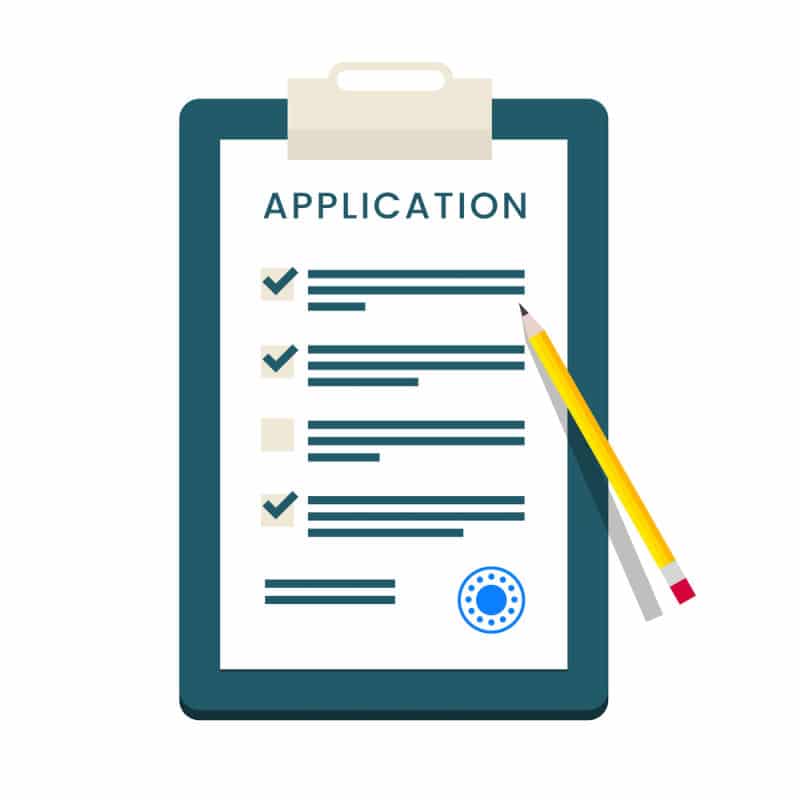
How to apply for short term disability in Canada
Applying for short term disability can be stressful — especially when you’re unfamiliar with the process. But don’t worry, we’ve simplified it for you so you don’t have to worry about making mistakes or missing any steps, the following is a simple (yet complete) process for applying for STD temporary disability benefits.
Please note: the process for applying for STD benefits is plan-specific, so you will need to check your benefits booklet or policy to see exactly how it will work in your situation. However, the following is a general overview of the application process for most STD plans.
Keep reading to learn how to get short term disability!
1. Make sure you qualify
The first step in applying for short term diabaility is to make sure you even qualify for the program. For example, in some plans, you need to use all the paid time off you have through your job before you can apply. This includes paid sick leave and vacation days. So, read your group benefits booklet or talk to your plan administrator to make sure you qualify.
2. Make sure your doctor supports you
You can’t get STD benefits without your doctor’s support. Without it, you will have a very slim chance of getting approved. You will also need your doctor to fill out one of the application forms, so having your doctor onboard is absolutely integral. Book an appointment with them as soon as possible to discuss whether they agree with you taking this leave from work.
3. Get the application forms
Once your doctor is onboard, you’ll need to get the right forms to apply. These are the three most common ones:
- the Notice of Claim
- the Employers Report
- the Attending Doctor’s Report
These forms are almost the same for all short-term disability plans. But, you have to use the right form — one from the company you’re dealing with. Otherwise, they can reject your claim.
You fill out the Notice of Claim form. Then, you ask your work and doctor to fill out the others. Usually, you will submit these to an outside company. You should also submit any other documents they need. It’s your job to make sure that they all get to the right place.
4. Send the application and supporting documents to the insurer
Ideally, you want to send your application in one package with all supporting documents. This package should include the following:
- Your application form, completed and signed
- Sheet attached to the application form with any additional information that would not fit on the form
- Medical form completed and signed
- Employers form, completed and signed
- Cover letter (optional)
5. Cooperate with the insurer
Depending on your situation, the STD provider may ask for more information. In our experience, it’s always best to act in good faith and provide all information they ask for. Ultimately, if your claims end up in court, it will be more favourable for you and your credibility if you are courteous and do your best to get them everything they need.
6. Wait for the insurance company’s decision
The last and often most daunting step in applying for short term disability is to wait for the decision. Once all the forms are in, the insurer will start to judge your claim. It will either get denied or approved.
If the insurance company denies your application, you have the right to ask them to reconsider, which is called an appeal. I strongly recommend you consult with us at Resolute Legal or another disability law firm before going ahead with your appeal. Each appeal needs to be done strategically in order to maximize your chances of success. The right approach for you will be different from what others should do. This is because no two situations are the same. Click on the following link to learn more about why you should work with one of Resolute Legal’s experienced disability lawyers, and check out our article, reasons short-term disability can be denied, to learn why STD claims get denied and what you can do about it!
The steps listed above can be applied to anyone with a short term disability insurance plan in Canada — regardless of the province. But if you are looking for specific information on where to mail documents for EI Sickness in each province, check out the section below.
How to apply for short term disability in Ontario
Those applying for short term disability in Ontario have two options: apply for short-term disability insurance through their employment or apply for the government of Canada short term disability benefit, otherwise known as EI Sickness benefits. If you are applying for EI Sickness, you can submit your application online and drop your supporting documents off at the nearest Service Canada or mail them to the following address:
Service Canada Centre
P.O. Box 2602
Mississauga ON L4T 0B1
If you are applying for Ontario short term disability benefits, follow the six steps listed above.
Most common short term disability ontario insurance companies in Ontario:
- ACA Insurance
- Assumption Life Financial Services
- BMO Life Assurance Company
- Blue Cross Life Insurance Company
- Canadian Tire Life Insurance
- Cigna / Life Insurance Company of North America
- Co-operators Life Insurance Company
- Desjardins DFS Life Insurance
- Empire Life Insurance Company
- Fenchurch General Insurance Company
- Great-West Life Assurance Company
- Humania Assurance
- IA Excellence Life Insurance Company
- Industrial Alliance Life Insurance
- Industrial Alliance Pacific Life
- La Capitale Life Insurance
- Manulife / Manufacturers Life Insurance Company
- Medavie Blue Cross
- RBC Life Insurance Company
- ScotiaLife Financial
- SSQ Life Insurance Company
- Sun Life
- UL Mutual Company
- Wawanesa Life Insurance Company
How to apply for short term disability in BC
Many people ask us how to apply short term disability BC. The process for applying for BC short term disability is simple. You apply for short term disability insurance benefits (if you have them), or you apply for EI Sickness benefits. If you’re applying for short term employment disability insurance benefits, follow the steps listed in the section above.
If you’re applying for EI, the process is similar: make sure your doctor supports you, fill out the required forms, provide additional documents, etc. You can apply for EI Sickness online. However, you will have to submit additional documents either by dropping them off at the nearest Service Canada office or by mailing them to the following address:
Service Canada Centre
P.O. Box 245
Edmonton AB T5J 2J1
Most common short term disability plans/ insurance companies in BC:
- Allstate Insurance
- Assumption Life (Assumption Group)
- Beneva (formerly La Capitale and SSQ Insurance)
- Canada Life
- CIGNA Life
- The Co-operators
- Desjardins Insurance
- Edge Benefits (BeniPlus)
- Empire Life
- Equitable Life
- First Canadian
- Humania Insurance
- Industrial Alliance
- ivari
- Knights of Columbus
- Manulife
- National Bank Insurance
- Pacific Blue Cross
- RBC Insurance
- SISIP Financial
- Sun Life
How to apply for short term disability in Nova Scotia
The process for applying for Nova Scotia short term disability is straightforward. You apply for short term disability insurance benefits (if you have them), or you apply for Service Canada short term disability, otherwise known as EI Sickness benefits. If you’re applying for short term disability insurance benefits, follow the steps listed in the section above.
If you’re applying for EI, the process is similar: ensure your doctor supports your claim, complete the necessary forms, submit additional documents, etc. You can apply for EI Sickness online. However, you will need to submit additional documents either by dropping them off at the nearest Service Canada office or by mailing them to the appropriate address:
Service Canada Centre
P.O. Box 8548
St. John’s NL A1B 3P3
Most common short term disability insurance companies in Nova Scotia:
- Allstate Insurance
- Assumption Life (Assumption Group)
- Beneva (formerly La Capitale and SSQ Insurance)
- Canada Life
- CIGNA Life
- The Co-operators
- CUMIS Life
- Desjardins Insurance
- Edge Benefits (BeniPlus)
- Empire Life
- Equitable Life
- Fenchurch General
- First Canadian
- Humania Assurance
- Industrial Alliance
- ivari
- Knights of Columbus
- Manulife
- Medavie Blue Cross
- National Bank Insurance
- Pacific Blue Cross
- RBC Insurance
- SISIP Financial
- Sun Life
- Wawanesa Life
How to apply for short term disability in New Brunswick
Individuals seeking short-term disability benefits in New Brunswick have two avenues to explore: applying for short-term disability through their employment or applying for EI Sickness benefits. If you opt for EI Sickness, you can complete your application online and deliver your supporting documents to the nearest Service Canada office or mail them to the following address:
Service Canada Centre
P.O. Box 8548
St. John’s NL A1B 3P3
For those applying for New Brunswick short-term disability benefits, adhere to the six steps outlined above.
Most common short term disability insurance companies in New Brunswick:
- Allstate Insurance
- Assumption Life (Assumption Group)
- Beneva (formerly La Capitale and SSQ Insurance)
- Canada Life
- CIGNA Life
- The Co-operators
- CUMIS Life
- Desjardins Insurance
- Edge Benefits (BeniPlus)
- Empire Life
- Equitable Life
- Fenchurch General
- First Canadian
- Humania Assurance
- Industrial Alliance
- ivari
- Knights of Columbus
- Manulife
- Medavie Blue Cross
- National Bank Insurance
- Pacific Blue Cross
- RBC Insurance
- SISIP Financial
- Sun Life
- Wawanesa Life
How to apply for short term disability in Alberta
Individuals seeking short-term disability Alberta have two avenues to explore: applying for short-term disability through their employment or applying for EI Sickness benefits. If you opt for EI Sickness, you can complete your application online and deliver your supporting documents to the nearest Service Canada office or mail them to the following address:
Service Canada Centre
P.O. Box 245
Edmonton AB T5J 2J1
For those applying for Alberta short-term disability benefits (insurance), adhere to the six steps outlined above.
Most common short term disability insurance companies in Alberta:
- Alberta Blue Cross
- Allstate Insurance
- AMA Insurance
- Assumption Life (Assumption Group)
- Beneva (formerly La Capitale and SSQ Insurance)
- Canada Life
- CIGNA Life
- The Co-operators
- CUMIS Life
- Desjardins Insurance
- Edge Benefits (BeniPlus)
- Empire Life
- Equitable Life
- Fenchurch General
- First Canadian
- Humania Insurance
- Industrial Alliance
- ivari
- Knights of Columbus
- Manulife
- National Bank Insurance
- RBC Insurance
- SISIP Financial
- Sun Life
- Wawanesa Life
How to apply for short term disability in Manitoba
The process for applying for short term disability Manitoba is straightforward. You apply for short-term disability insurance benefits (if you have them), or you apply for EI Sickness benefits. If you’re applying for short-term disability insurance benefits, follow the steps listed in the section above.
If you’re applying for EI, the process is similar: ensure your doctor supports your claim, complete the necessary forms, submit additional documents, etc. You can apply for EI Sickness online. However, you will need to submit additional documents either by dropping them off at the nearest Service Canada office or by mailing them to the appropriate address:
Service Canada Centre
P.O. Box 245
Edmonton AB T5J 2J1
Most common disability insurance companies in Manitoba:
- Allstate Insurance
- Assumption Life
- Beneva
- Canada Life
- CIGNA Life
- The Co-operators
- CUMIS Life
- Desjardins Insurance
- Edge Benefits (BeniPlus)
- Empire Life
- Equitable Life
- Fenchurch General
- First Canadian
- Industrial Alliance
- ivari
- Knights of Columbus
- Manitoba Blue Cross
- Manulife
- National Bank Insurance
- RBC Insurance
- SISIP Financial
- Sun Life
- Wawanesa Life
How to apply for short term disability in Newfoundland
Individuals seeking short-term disability benefits in Newfoundland have two avenues to explore: applying for short-term disability through their employment or applying for EI Sickness benefits. If you opt for EI Sickness, you can complete your application online and deliver your supporting documents to the nearest Service Canada office or mail them to the following address:
Service Canada Centre
P.O. Box 8548
St. John’s NL A1B 3P3
For those applying for Newfoundland short-term disability benefits (insurance), adhere to the six steps outlined above.
Most common disability insurance companies in Newfoundland:
- Allstate Insurance
- Assumption Life (Assumption Group)
- Beneva (formerly La Capitale and SSQ Insurance)
- Canada Life
- CIGNA Life
- The Co-operators
- CUMIS Life
- Desjardins Insurance
- Edge Benefits (BeniPlus)
- Empire Life
- Equitable Life
- Fenchurch General
- First Canadian
- Industrial Alliance
- ivari
- Knights of Columbus
- Manulife
- Medavie Blue Cross
- National Bank Insurance
- Pacific Blue Cross
- RBC Insurance
- SISIP Financial
- Sun Life
- Wawanesa Lifelo
How to apply for short term disability in PEI
In PEI, you can either apply for short term disability insurance or apply for EI Sickness. If you’re applying for short term disability insurance benefits, scroll up to the section above and follow those instructions. If you’re applying for EI Sickness, the process is pretty much the same. However, the qualifying criteria differ slightly and instead of sending your application to an insurance company, you send it to Service Canada.
You can apply for EI Sickness online. However, you must drop off additional documents at your nearest Service Canada office or mail them to the following address:
Service Canada Centre
P.O. Box 8548
St. John’s NL A1B 3P3
Most common short term disability insurance companies in PEI:
- Allstate Insurance
- Assumption Life (Assumption Group)
- Beneva (formerly La Capitale and SSQ Insurance)
- Canada Life
- CIGNA Life
- The Co-operators
- CUMIS Life
- Desjardins Insurance
- Edge Benefits (BeniPlus)
- Empire Life
- Equitable Life
- Fenchurch General
- First Canadian
- Industrial Alliance
- ivari
- Knights of Columbus
- Manulife
- Medavie Blue Cross
- National Bank Insurance
- RBC Insurance
- SISIP Financial
- Sun Life
- Wawanesa Life
How to apply for short term disability in Saskatchewan
Individuals seeking short term disability benefits in Saskatchewan have two avenues to explore: applying for short term disability through their employment or applying for EI Sickness benefits. If you opt for EI Sickness, you can complete your application online and deliver your supporting documents to the nearest Service Canada office or mail them to the following address:
Service Canada Centre
P.O. Box 245
Edmonton AB T5J 2J1
For those applying for Saskatchewan short-term disability insurance benefits, adhere to the six steps outlined in the section above.
The following are the most common short term disability insurance companies in Saskatchewan:
- Allstate Insurance
- Assumption Life
- Beneva
- Canada Life
- CIGNA Life
- The Co-operators
- CUMIS Life
- Desjardins Insurance
- Edge Benefits
- Empire Life
- Equitable Life
- Fenchurch General
- First Canadian
- Humania Assurance
- Industrial Alliance
- ivari
- Knights of Columbus
- Manulife
- National Bank Insurance
- RBC Insurance
- Saskatchewan Blue Cross
- SISIP Financial
- Sun Life
- Wawanesa Life
Chapter 3
What Qualifies for Short Term Disability & How Much Does it Pay?
In this chapter, I review the conditions that qualify for short term as well the general eligibility criteria.
I also overview you how much short term disability pays.
Let’s dive in!
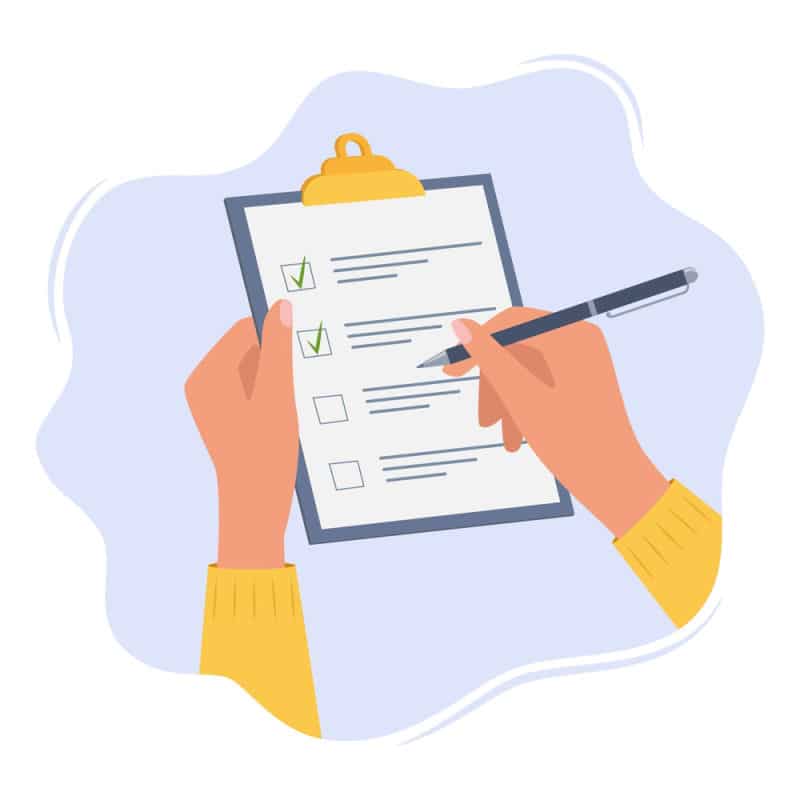
What qualifies for short-term disability leave?
People often ask what conditions qualify for short-term disability. Really, any condition can qualify as long as the person has STD coverage. You have to meet the definition of “total disability.” Above all, eligibility for STD is based on how bad your symptoms are — not your condition.
So, what matters is if the symptoms keep you from doing your job’s main duties. But your diagnosis is still important! This is because a diagnosis allows for a treatment plan. If your diagnosis is unknown, then doctors can’t treat you. Instead, you’ll have to do lots of tests to rule out possible conditions.
Insurance companies don’t like it when there’s no diagnosis or treatment plan. If they don’t see you working to figure it out, then they will deny your claim or stop payments.
There are some types of claims that are denied often. Stress leave, burnout, and pregnancy are a few examples.
So, in these situations, you must have a concrete diagnosis. For example, stress and burnout aren’t very clear. But, you might be diagnosed with depression or anxiety. Pregnancy isn’t a disability, but there might be a complication that stops you from working.
Examples of short-term disability conditions
As discussed, eligibility for short term disability is not based on your diagnosis, rather it is centred around how your symptoms prevent you from working. The following are some examples of medical conditions that may qualify for STD leave:
Short term disability mental health conditions:
- ADHD
- Autism
- Anxiety
- Bipolar Mood Disorder
- Depression
- OCD
- Schizophrenia
- Stress/ Burnout
Muskoskelal conditions:
- Back Problems
- Carpal Tunnel Syndrome
- Arthritis
- Neck and Cervical Disorders
- Knee Disorders
- Fibromyalgia
Cancer:
- Blood & Lymphoid Cancer
- Bone & Soft Tissue Cancer
- Brain & Central Nervous System Cancer
- Breast Cancer
- Digestive System Cancer
- Head & Neck Cancer
- Lung Cancer.
- Pelvic Area Cancer
Circulatory conditions:
- Heart Disease
- Atherosclerosis
- Heart attack
- Mitral valve prolapse
- Mitral valve regurgitation
- Mitral stenosis
- Angina pectoris
- Arrhythmias
- Cardiac ischaemia
- High cholesterol
- Heart failure
- Hypertension
- Stroke
- Peripheral artery disease
- Venous thromboembolism
- Aortic aneurysm
Nervous System:
- Multiple Sclerosis
- Headache and Migraine
- Alzheimer’s Disease
- Chronic Fatigue Syndrome
- Chronic Pain
- Complex Regional Pain Syndrome
- Crohn’s Disease
- Lupus
- Lyme Disease
- Long COVID
Other:
- Irritable Bowel Syndrome (IBS)
- Accidents/ injuries
Please note: this is not a comprehensive list. Just because a condition isn’t listed doesn’t mean you won’t qualify.
How much does short term disability pay?
The amount you will receive depends on your plan. So, we can’t tell you exactly how much you will get. However, most plans cover anywhere from 60 to 70 percent of your salary. Check your benefits booklet or contact your plan administrator to learn more about your plan’s payment amounts.
Chapter 4
After Approval of Short-Term Disability Benefits
You still have to deal with your insurer after you’re approved. To keep your benefits, you must carefully manage your relationship with the insurance company. You’ll need to do what they ask, even if you don’t want to.
In this chapter, we will review some things you may have to do after getting approved for short-term disability benefits, as well as the process of switching to long term disability and employment rights while collecting short term disability.
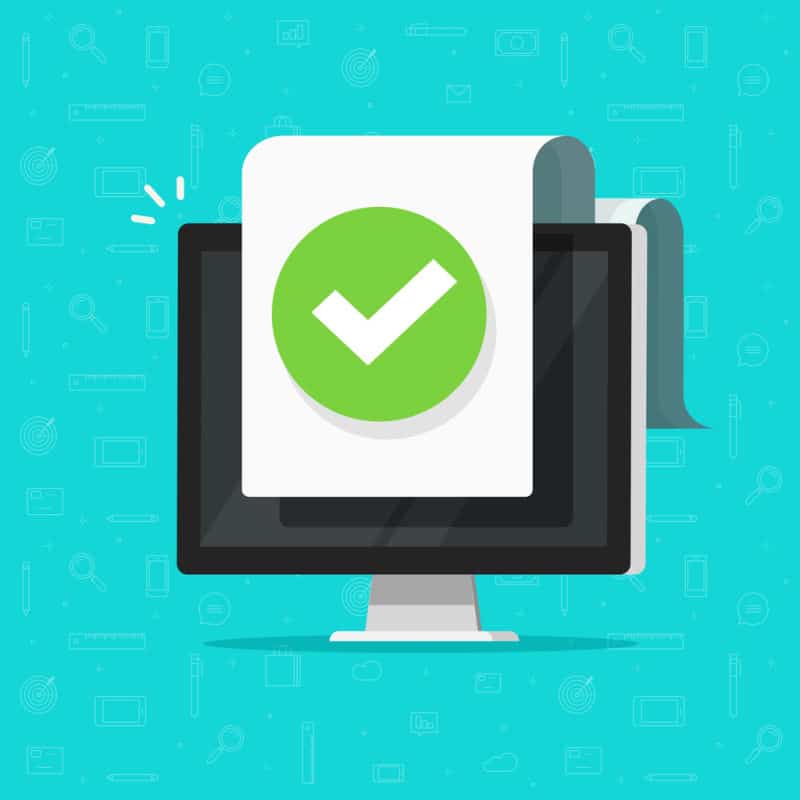
After approval of short-term disability Canada
You still have to deal with your insurer after you’re approved. To keep your benefits, you must carefully manage your relationship with the insurance company. You’ll need to do what they ask, even if you don’t want to.
In this chapter, we will review some things you may have to do after getting approved for short-term disability benefits.
Continuing medical review
The payment of benefits is conditional. You have to keep giving proof that you’re disabled. In other words, the insurance company watches you. You’ll need to send in updates and reports from your doctor on a regular basis. They’ll likely phone you for updates, too. This can last until the end of your benefits period. They do this more often if you’re young or if they think you will get better.
The insurance company has a legal right to perform this ongoing medical review. Therefore, you have to cooperate with them, or they can stop your payments.
Treatment and return to work programs
You might have to do treatment or return to work programs — physiotherapy, occupational therapy, and psychological therapy, for example. This is more common with long-term disability plans but can happen in the short term, too. They can’t force you to go, but if you don’t, they can stop your payments.
So, if you have been getting benefits for a few months, be aware that you might be sent for treatment soon.
Independent medical examinations
Most disability plans allow the company to send you to a doctor that they choose. This is called an independent medical examination, or IME.
The doctor for an IME doesn’t treat you, however. An IME is a one-time visit. You go so that the doctor can give a medical-legal opinion to your insurer.
After the exam, the doctor will send a report to the insurance company. The report will give their opinion about your medical conditions, treatment, and ability to work. It will also answer any questions that the insurance company asks.
It’s common for people not to want to attend these exams. Some common reasons are that the doctor doesn’t specialize in their condition, for example. Another example is that the doctor has bad reviews online.
While these are valid concerns, you still need to attend. The insurance company has the right to choose the doctor, even if you disagree with their choice. If you refuse to go, then they have the right to stop your payments.
Again, IMEs are less common with short-term disability than long-term — but they can happen. Go to the exam in good faith, even if the doctor has bad reviews. You may be happily surprised by the results. Sometimes, the doctor will fully support you.
Surveillance
Many people are surprised to learn that insurance companies hire private investigators. This is more common in long-term disability claims, but it happens in short-term claims, too. Also, they’re more likely to watch you if you’re young or if your payment is high, for example.
Video surveillance is legal, but only in public spaces. An investigator can record you on your property as long as they’re on the public sidewalk. Similarly, online surveillance is limited to things that are posted publicly.
In my experience, surveillance rarely shows that a person is a liar. However, you have to be careful when you describe your limitations. You don’t want a video of you walking if you said you couldn’t, for example. The insurer wants to make you seem less honest. So, catching you in a small lie is one way to do that.
Interaction with EI sickness benefits
You can’t receive EI sickness benefits and short-term disability at the same time. In fact, if you do receive both, you will need to pay some back.
For example, imagine you got EI sickness payments for two weeks. Then, you get approved for short-term disability, and they will pay you for those same two weeks. This creates an overlap. If there’s an overlap, then you’ll need to pay back the EI program.
After you’re approved for short-term disability, you’ll receive a back payment. Then, you can refund EI using that money.
Going from STD to long term disability
Short-term disability benefits cover a short leave from work. The amount of time varies between plans, but it’s generally between 17-52 weeks. The maximum benefit period is the maximum number of weeks you can get payments.
You might reach the end of the benefit period and still not be able to work. In that case, you can look into long-term disability benefits. Many plans that include short-term disability benefits will also include long-term.
Often, the same company that handles your short-term disability claim will also handle your long-term claim. If so, you can get forms to switch over from short-term to long-term.
A different insurance company might handle long-term disability. In this case, you will need to submit a new application. It will include forms similar to the ones you have done.
Further reading: What’s the Difference Between Short and Long-Term Disability Benefits?
Employment rights on short term disability
Employers have the right to fire a person who is on sick leave. Most employers won’t do this, however. There are practical and legal reasons. Firstly, you must get reasonable notice of termination to be fired legally. Otherwise, without notice, they have to pay you severance. This is the same for those on sick leave and those actively working.
As an employee on sick leave, you may be protected by human rights laws. Namely, laws that prevent discrimination against disability. However, protection under these laws isn’t guaranteed. Not all sick leaves qualify as a “disability,” — especially if you’re expected to recover shortly.
Being protected under these laws can mean a few things. Your employment is protected — but maybe not your specific role. And your employer has a duty to accommodate your disability. They might modify your job, allow you to work reduced hours, or move you to a different role.
If you’re on sick leave that goes well beyond the short-term disability period, then your employer eventually has the right to stop your employment. Yes — even without notice of termination or severance pay.
Key takeaways on short-term disability benefits in Canada
If you reach the end of your benefit period and you are still unable to work, you may need to apply for long-term disability benefits.
Short-term disability benefits cover a short leave from work. The amount of time varies between plans, but it’s generally between 17-52 weeks. The maximum benefit period is the maximum number of weeks you can get payments.
You might reach the end of the benefit period and still not be able to work. In that case, you can look into long-term disability benefits. Many plans that include short-term disability benefits will also include long-term.
Often, the same company that handles your short-term disability claim will also handle your long-term claim. If so, you can get forms to switch over from short-term to long-term.
A different insurance company might handle long-term disability. In this case, you will need to submit a new application. It will include forms similar to the ones you have done.
Take the next step: download our free book
Click on the image below to learn more about our free book on managing your own short-term disability claim in Canada. Learn the secrets to winning benefits, even after a denial.
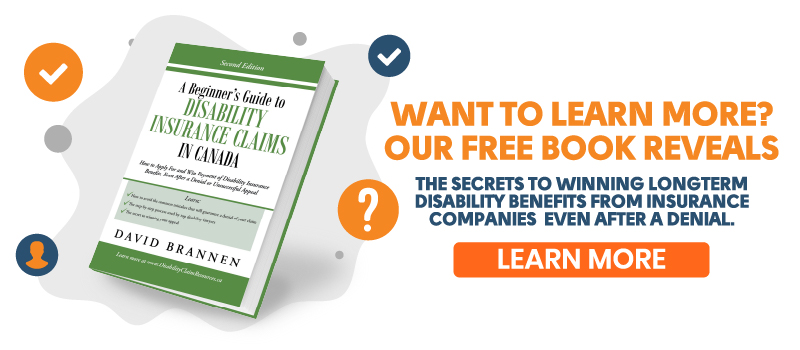
FAQs
Who pays for short term disability insurance?
Sometimes, work-funded plans look like group plans. It might seem like an insurance company is in charge of judging claims and paying, for example. But, behind the scenes, it’s the employer who pays.
Is short term disability taxable?
Can you travel while on short term disability in Canada?
Vacations and travel out of the country are more appropriate when you are on long-term disability once your disability and treatment plan is established.
When does short term disability start?
Can you collect EI and short-term disability?
Do you get paid for the waiting period of short-term disability?
Can you work while on short term disability (STD)?
In addition, working another job while on short term disability could put your claim at risk. Always consult with a disability lawyer before undertaking another position.
Can your employer contact you while on short-term disability?
Can you go on vacation while on short term disability?
Sick leave vs short term disability, what’s the difference?
Short-term disability stress leave, does short term disability cover it?
Short-term disability return to work laws and other resources
The rules for short-term disability claims are different for every situation. You can find them in three places:
1. Your disability plan or policy. Every policy or plan is unique. Therefore, you shouldn’t take advice from people who aren’t covered under the same plan as you. Instead, you should get a copy of your own policy or group benefits booklet. Usually, you can get your benefits booklet from your employer or union.
2. The insurance laws for your province. Short-term disability benefits are also controlled by each province. They have similar laws, but they aren’t the same. Don’t take advice from people who may be thinking of the laws from another province!
- Ontario Insurance Law
- Nova Scotia Insurance Law
- New Brunswick Insurance Law
- PEI Insurance Law
- Newfoundland Insurance Law
- Manitoba Insurance Law
- Saskatchewan Insurance Law
- Alberta Insurance Law
- BC Insurance Law
3. The common law of Canada. Finally, the last source of rules is the common law of Canada. “Common law” refers to decisions made in court cases. After they’re settled, they create guidelines for future cases.
Other resources:

